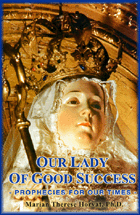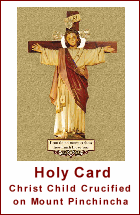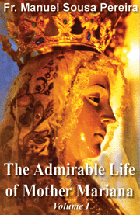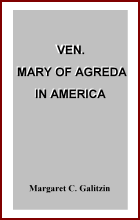What People Are Commenting
Index, Tattoos & Knighthood for Jews
Doubts about Tattoos
Dear Fr. Somerville,
I consider myself a Traditionalist Catholic. I just turned 50 and am wholly attached to the Tridentine Mass. I was brought up a Catholic in the post conciliar church, however - I find myself becoming increasingly attached to the 1962 Missal and the older form of the Sacraments. For what it’s worth, I am also a retired NYC Police Officer.
I look for guidance from Priests in the older tradition of the Church.
I read your remarks on tattoos, and have always thought them to be unseemly and bordering on being a venial sin.
My question to you is this: Would a small tattoo of St. Michael slaying Satan be an exception to your thinking on the matter?
I’ve always worn a St. Thomas More medal around my neck, and would rather not change it after all these decades. Your thoughts on this matter would be greatly appreciated.
Warm regards & thanks for reading this,
M.B.
TIA responds:
Dear Mr. M.B.,
Unfortunately, Fr. Somerville at this moment is not in conditions to answer your question. He is receiving care in a nursing home in Canada after having suffered a stroke.
You may find more data to resolve your doubt by reading this post on a quite similar matter.
Cordially,
TIA correspondence desk
I consider myself a Traditionalist Catholic. I just turned 50 and am wholly attached to the Tridentine Mass. I was brought up a Catholic in the post conciliar church, however - I find myself becoming increasingly attached to the 1962 Missal and the older form of the Sacraments. For what it’s worth, I am also a retired NYC Police Officer.
I look for guidance from Priests in the older tradition of the Church.
I read your remarks on tattoos, and have always thought them to be unseemly and bordering on being a venial sin.
My question to you is this: Would a small tattoo of St. Michael slaying Satan be an exception to your thinking on the matter?
I’ve always worn a St. Thomas More medal around my neck, and would rather not change it after all these decades. Your thoughts on this matter would be greatly appreciated.
Warm regards & thanks for reading this,
M.B.
______________________
TIA responds:
Dear Mr. M.B.,
Unfortunately, Fr. Somerville at this moment is not in conditions to answer your question. He is receiving care in a nursing home in Canada after having suffered a stroke.
You may find more data to resolve your doubt by reading this post on a quite similar matter.
Cordially,
TIA correspondence desk
______________________
Knight of Columbus Was a ‘Married’ Homo
TIA,
Another scandal: A “married” homosexual man was a Knight of Columbus and a Grand Knight of another progressivist organization.
It reveals the rotten fruits spawned by Vatican II. No progressivist priest masquerading as Catholic cared enough about this man's soul to tell him that, barring repentance, he was living a life leading to eternal perdition!
Click here and read, if you can stomach it.
Gary Morella
Another scandal: A “married” homosexual man was a Knight of Columbus and a Grand Knight of another progressivist organization.
It reveals the rotten fruits spawned by Vatican II. No progressivist priest masquerading as Catholic cared enough about this man's soul to tell him that, barring repentance, he was living a life leading to eternal perdition!
Click here and read, if you can stomach it.
Gary Morella
______________________
Catholic Knighthood for Rabbis
TIA,
On April 27, Francis will award knighthood of Saint Sylvester to a rabbi for interreligious dialogue and for pushing holocaust education on the world.
The Vatican’s representative to the United Nations, Archbishop Bernardito Auza says this about Schneier:
“Pope Francis is bestowing the honor on Rabbi Arthur Schneier, who has worked unceasingly to promote peace and mutual understanding, in the firm conviction that respect for fundamental human rights, including religious freedom, are indispensable values for all peoples of the world to enjoy peace, security and shared prosperity. A Holocaust survivor, Rabbi Schneier has always held this conviction in his heart and made it a principle of life.”
Another rabbi made a Knight of St. Gregory in 2005
In November 2005, pro-abortion Rabbi Rosen was made a Knight Commander of the Pontifical Order of St. Gregory the Great by the Holy See for his contribution to “promoting Catholic-Jewish reconciliation.”
The Order of St. Gregory is one of the five pontifical orders of knighthood in the Catholic Church, originally founded by Pope Gregory XVI in 1831.
Card. Walter Kasper, then President of the Commission for Religious Relations with the Jews, conducted the investiture, which was designed to correspond to the 40th anniversary celebrations in Israel of the Second Vatican Council's Nostra aetate, the Declaration on the Relation of the Church to Non-Christian Religions promulgated by Pope Paul VI on October 28, 1965.
On May 6, 2010, Archbishop Timothy Dolan of New York hosted Rosen at his residence to discuss Catholic-Jewish and Vatican-Israeli relations in the wake of the Special Vatican Synod on the Middle East. As his brother's keeper, Rosen has much to be desired. And yet, to such a man the Holy See awarded a knighthood “in recognition of his “service to the Church ... and the good example set in his communities and country.”
Rosen, a “good example?” Of what?
Randy Engel
On April 27, Francis will award knighthood of Saint Sylvester to a rabbi for interreligious dialogue and for pushing holocaust education on the world.
The Vatican’s representative to the United Nations, Archbishop Bernardito Auza says this about Schneier:
“Pope Francis is bestowing the honor on Rabbi Arthur Schneier, who has worked unceasingly to promote peace and mutual understanding, in the firm conviction that respect for fundamental human rights, including religious freedom, are indispensable values for all peoples of the world to enjoy peace, security and shared prosperity. A Holocaust survivor, Rabbi Schneier has always held this conviction in his heart and made it a principle of life.”
Another rabbi made a Knight of St. Gregory in 2005
In November 2005, pro-abortion Rabbi Rosen was made a Knight Commander of the Pontifical Order of St. Gregory the Great by the Holy See for his contribution to “promoting Catholic-Jewish reconciliation.”
The Order of St. Gregory is one of the five pontifical orders of knighthood in the Catholic Church, originally founded by Pope Gregory XVI in 1831.
Card. Walter Kasper, then President of the Commission for Religious Relations with the Jews, conducted the investiture, which was designed to correspond to the 40th anniversary celebrations in Israel of the Second Vatican Council's Nostra aetate, the Declaration on the Relation of the Church to Non-Christian Religions promulgated by Pope Paul VI on October 28, 1965.
On May 6, 2010, Archbishop Timothy Dolan of New York hosted Rosen at his residence to discuss Catholic-Jewish and Vatican-Israeli relations in the wake of the Special Vatican Synod on the Middle East. As his brother's keeper, Rosen has much to be desired. And yet, to such a man the Holy See awarded a knighthood “in recognition of his “service to the Church ... and the good example set in his communities and country.”
Rosen, a “good example?” Of what?
Randy Engel
______________________
Seminaries & Crisis in the Church
Dear TIA,
I am a young man who feels called by God to become a priest. Now, I still have some praying and reflecting to do in considering God's Will for my vocation, but I could really use some advice about what seminary I would go to if I did decide to become a priest. Given the present crises in the Church, my options would be limited. I strongly oppose Sede-vacantism and the Conciliar Revolution in the Church. I also oppose those traditionalist groups who have sold out and who have promised to keep quiet concerning the revolution in the Church.
Fifteen years ago I would have no problem deciding who I would go to become a priest. It would be the SSPX. But now there are questions concerning their leadership. I am not sure that Bishop Fellay wants to sell out, but I am not certain that he will not sell out. I do think it would be legitimate for the SSPX to be recognized by Rome and acquire proper canonical status through a personal prelature and acquire other safeguards without compromising. However, I think that is practically impossible and extremely dangerous to try.
I am not so sure about the SSPX of the strict observance either. Besides, they are not an actual society or fraternity, but rather a loose affiliation of priests. I heard they might have a small seminary in the US or in France. If I were to go to them, what would I do after I would be ordained? Well, I guess I would do whatever I saw fit, since I would have no superiors. I would have advice not orders. I desire to have superiors to submit to who are wiser than myself concerning spiritual and practical matters, but I do not want to be under superiors who desire to compromise my faith.
Please offer me some insight or suggestions concerning this.
Instaurare omnia in Christo!
T.R.
TIA responds:
Dear T.R.,
We compliment you on your clear view about the present day crisis in the Church.
We do not have conditions to tell you to go to this or that seminary, since this advice would entail a decision for your entire life. Unfortunately, like you, we are not sure about the direction this or that faction of traditionalism will take in the next years.
The only advice we can offer you is: pray to Our Lady of Good Counsel of Genazzanno to inspire you to make the right decision.
Thank you for your confidence.
Cordially,
TIA correspondence desk
I am a young man who feels called by God to become a priest. Now, I still have some praying and reflecting to do in considering God's Will for my vocation, but I could really use some advice about what seminary I would go to if I did decide to become a priest. Given the present crises in the Church, my options would be limited. I strongly oppose Sede-vacantism and the Conciliar Revolution in the Church. I also oppose those traditionalist groups who have sold out and who have promised to keep quiet concerning the revolution in the Church.
Fifteen years ago I would have no problem deciding who I would go to become a priest. It would be the SSPX. But now there are questions concerning their leadership. I am not sure that Bishop Fellay wants to sell out, but I am not certain that he will not sell out. I do think it would be legitimate for the SSPX to be recognized by Rome and acquire proper canonical status through a personal prelature and acquire other safeguards without compromising. However, I think that is practically impossible and extremely dangerous to try.
I am not so sure about the SSPX of the strict observance either. Besides, they are not an actual society or fraternity, but rather a loose affiliation of priests. I heard they might have a small seminary in the US or in France. If I were to go to them, what would I do after I would be ordained? Well, I guess I would do whatever I saw fit, since I would have no superiors. I would have advice not orders. I desire to have superiors to submit to who are wiser than myself concerning spiritual and practical matters, but I do not want to be under superiors who desire to compromise my faith.
Please offer me some insight or suggestions concerning this.
Instaurare omnia in Christo!
T.R.
______________________
TIA responds:
Dear T.R.,
We compliment you on your clear view about the present day crisis in the Church.
We do not have conditions to tell you to go to this or that seminary, since this advice would entail a decision for your entire life. Unfortunately, like you, we are not sure about the direction this or that faction of traditionalism will take in the next years.
The only advice we can offer you is: pray to Our Lady of Good Counsel of Genazzanno to inspire you to make the right decision.
Thank you for your confidence.
Cordially,
TIA correspondence desk

Posted April 28, 2015
______________________
The opinions expressed in this section - What People Are Commenting - do not necessarily express those of TIA
______________________
______________________


















Here are two questions. The first is: Do you know if it is possible to obtain a copy of the Index Librorum Prohibitorum as it was just before it was abolished?
The second is: Does the communicant chew the Communion Wafer, or let it dissolve?
Thank you ever so much for your time!
Respectfully yours,
A.F.
TIA responds:
Dear A.F.,
You may find general information on the Index here; a list of the authors and books on the Index in English here.
When a Catholic receives the Holy Eucharist in the Roman Rite he is not supposed to chew it but let it dissolve in his mouth. The time the divine presence remains in a consecrated Host in the mouth of the communicant is about 10 minutes. During this period the faithful should be recollected in his thanksgiving prayers after Communion.
In some Eastern Rites the Host is not as delicate as in the Roman Rite; for example, it can be a slice of a unleavened bread. In this case the faithful may chew it, swallow it and maintain the same time of recollection and thanksgiving after Communion.
Cordially,
TIA correspondence desk